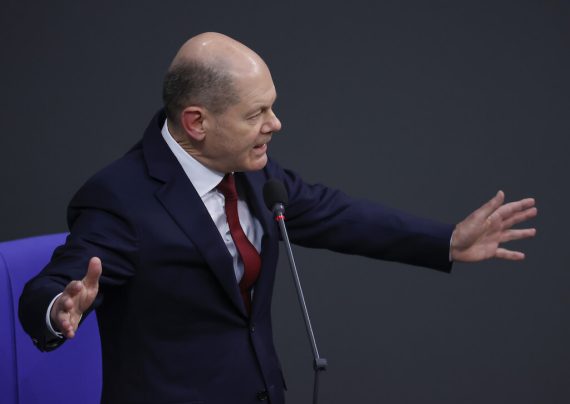The Russia-Ukraine war marks a historic turn in German foreign and security policy. Chancellor Olaf Scholz has announced that Germany wants to invest €100 billion in rearming the military. Almost all parties in the Bundestag support this historic decision. While the AfD remains passive, the Left Party is divided.
One of the first consequences of the Russian invasion of Ukraine for Germany and for its new Ukraine policy was the cancellation of the very important and, at the same time, very controversial Nord Stream 2 project. Manuela Schwesig of the SPD, head of the government of Mecklenburg-Vorpommern (MV), announced her intention to dissolve the Stiftung Klima- und Umweltschutz MV (MV Climate and Environmental Protection Foundation).
The foundation originally served to protect the Nord Stream 2 project from American sanctions. Several investors such as Shell and the Austrian energy company OMV have also withdrawn from the project. The German company Uniper estimates a loss of €900 million. The German environmental aid organization Deutsche Umwelthilfe even speaks of the Nord Stream 2 project being terminated definitely. The pipeline, which cost billions, will go down as one of Europe’s biggest misinvestments.
Another figure affected by the termination of the Nord Stream 2 project is former SPD Chancellor Gerhard Schröder. He was the main initiator of the gas pipeline by actively lobbying for it. Now the Taxpayers’ Association is calling on Chancellor Scholz to confiscate Schröder’s office equipment in Berlin.
Schröder’s long-time office manager and speechwriter Albrecht Funk ended his co-operation employment with Schröder after more than 20 years of working together.
The football club BVB Dortmund has withdrawn Schröder’s honorary membership and Hannover 96 is considering kicking the former chancellor out. The pressure exerted on Schröder at different levels shows that Schröder’s distancing himself from Putin is of high importance in Germany.
Schröder is the best-known German politician who maintains a good relationship with Putin. If Schröder were to step down and end his relations with Putin, Germany and Russia would lose a trustworthy mediator in a possible diplomatic solution.
Germany arms up
At the same time, there were also drastic decisions in German foreign policy. On February 24, Chancellor Olaf Scholz gave a speech in which he underlined the importance of German security policy. The beginning of Russia’s invasion of Ukraine marked a dark day in Europe, Scholz said.
There is now a change at the heart of the coalition government. Foreign Minister Annalena Baerbock had previously spoken out against arms deliveries to Ukraine. However, the situation has now changed, and the world is at a different place since Russia’s invasion, said Baerbock. Therefore, she said, Germany had to adapt to the new situation in international politics.
Germany’s adaptation to the current situation came about surprisingly quickly. Scholz’s statements that Germany wants to allocate €100 billion of its budget to the the Bundeswehr, Germany’s armed forces and to comply with the 2% GDP benchmark for NATO is of historical significance. Due to Germany’s Nazi past (1933-1945), the country has pursued a policy of demilitarization since the end of World War II.
The fact that it is precisely a social democratic party, the SPD, and the Greens, a party known for its pacifist stance, that are responsible for Germany’s rethinking makes the situation all the more paradoxical. However, this is not the first time in Germany’s history that this paradox has appeared.
In the Kosovo war of 1998, Germany actively participated in a war for the first time since the end of World War II. The government at the time was made up of the SPD and the Greens.
Recommended
How other German parties responded
While there is a general consensus within the coalition government on Germany’s rearmament, and the largest opposition parties (CDU/CSU) also support this decision, reactions differ among the marginal parties AfD and Left Party. CDU foreign policy expert Norbert Röttgen praised Chancellor Scholz’s decision to increase Germany’s armament and said he was positively surprised.
The AfD, on the other hand, which is known for its close ties to Russia, for the time is internally discussing its future attitude towards Russia. Several sections in the party are calling for a change in the course of the AfD’s policy on Russia. AfD MP Joachim Wundrak, for example, is in favor of sanctions against Russia, but they should not be so far reaching as to harm Germany.
The AfD parliamentary group leader Alice Weidel calls Russia’s invasion illegal under international law, but rejects arms deliveries to Ukraine and favors a diplomatic solution between Russia and Ukraine.
In the Left Party, the situation looks much more complicated. Here there is an open conflict between the foreign policy spokesperson Gregor Gysi and the former parliamentary group leader Sahra Wagenknecht. Wagenknecht and six other Left Party MPs had issued a statement categorically rejecting German arms deliveries to Ukraine and imposing economic sanctions against Russia. Gysi clearly criticizes Wagenknecht and says that her statement would in effect deny Ukraine’s right of self-defense.

VIDEO: Russian Expansionism under Vladimir Putin
Gysi accuses Wagenknecht of lack of emotion and empathy for the Ukrainian people, and at the same time questions the current course of the Left Party. Wagenknecht responds to Gysi’s accusations, calling his statements defamation of character and stating that she holds sympathy for the Ukrainian dead and injured. Wagenknecht, however, continues to stand by her position and emphasizes the possibility of resolving the war diplomatically.
Russia-Ukraine impact on German politics
The developments in the Russia-Ukraine war have influenced several levels of German politics. Germany’s rearmament, the sanctions against Russia, the cancellation of the Nord Stream 2 project and its consequences for Gerhard Schröder, and the diverging positions between and within political parties show the importance of the relationship between Germany and Russia.
The Russia-Ukraine war will not only change Germany’s attitude towards Russia but will also have far-reaching consequences for German foreign and security understanding. Germany’s discourse on military issues will be conducted differently in the future.
The fact that this change is taking place at a time when pacifist parties are in government can be seen as a paradox; however, this change can occur specifically because no opposition party of significant size is objecting to German rearmament and, as a result, the move is not up for debate.





